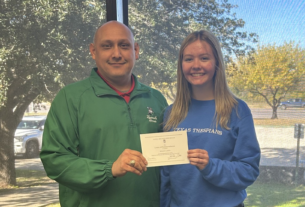The information in this column is not intended as legal advice but to provide a general understanding of the law. Any readers with a legal problem, including those whose questions are addressed here, should consult an attorney for advice on their particular circumstances.
I have done several columns on laws and topics Texas landowner need to be familiar with now that they own a piece of Texas and may have ventured into an ag business. This week, I thouht I would cover mortality insurance for livestock. In simple terms, livestock mortality insurance generally covers the premature death of a covered animal due to non-natural causes. This may include death from accident, injury, illness, disease, disability, or extreme weather. The exact coverage options will depend on what your specific policy includes, however. Essentially, this coverage will act like a business loss policy, where it helps cover the cost of replacing the animal, as well as any lost revenue between the time of the loss and the actual replacement. It’s important to note that exclusions may apply depending on your policy and that natural causes of death would not be covered.
What coverage options can be included?
When selecting a livestock mortality insurance policy, you may be able to add on additional coverage options for specific perils that are more likely to happen, such as those based on the type of animal or your local environment. Some of these coverage options may include extreme weather events, fire, vehicular accidents, theft, accidental shooting, wild animal attacks, and building collapses, among others. These options will allow you to focus your coverage for your operation.
What livestock can be covered?
Whether you have cows, chickens, sheep, goats, hogs, pigs, horses, alpaca, emus, or even zoo animals, you may be able to cover them with livestock mortality insurance.
What factors determine the cost of coverage?
There are several factors that may be used to determine the price of your livestock mortality insurance policy. For example, if you are insuring a single cow versus an entire herd of cattle, the price of the policy may vary based on sheer numbers. In addition, the type of animal you are covering may impact the cost, particularly in terms of how difficult it would be to replace that animal. Things like health conditions and age may also play a role. Regardless, a policy payout could mean the difference between holding steady or financial loss based on replacement cost and decreased revenue.
Real-world examples of risks and coverage solutions.
All businesses face risks unique to their particular industry, which is why it’s important to secure coverage that protects the needs of your specific business. For example, if you run a cow-calf operation and lose a cow in its prime, would you be able to afford a replacement without coverage? Many folks have gotten into chicken farms recently. What would you do if you lost a significant number of your laying hens due to non-natural causes, how would your recover those lost egg sales? If you run a business training service dogs, how would you deal with losing a service dog after countless hours of training? All of these types of risks need to be considered when selecting a livestock mortality insurance policy, and they are prime examples of why any business with animals and livestock as its main revenue source needs to consider this extra layer of protection.
Livestock operations that benefit from this coverage.
Many businesses rely on animals and may benefit from having a livestock mortality insurance policy in place. For example, cows, pigs, sheep, chickens, and goats would be commonly covered by traditional farming operations. Zoos would require unique coverage for the exotic and rare animals they feature. Breeders would need specialty coverage to protect their animals, such as purebreds and seed stock cattle. Whatever your operations are, having this policy in place is an important way to help safeguard your investment and revenue.
To protect your livestock operation, you should consult your insurance agent about mortality insurance. He or she may be able to guide you through the process of obtaining this coverage and save your bacon (pun intended).
Sam A. Moak is an attorney with the Huntsville law firm of Moak & Moak, P.C. He is licensed to practice in all fields of law by the Supreme Court of Texas, is a Member of the State Bar College, and is a member of the Real Estate, Probate and Trust Law Section of the State Bar of Texas. www.moakandmoak.com





